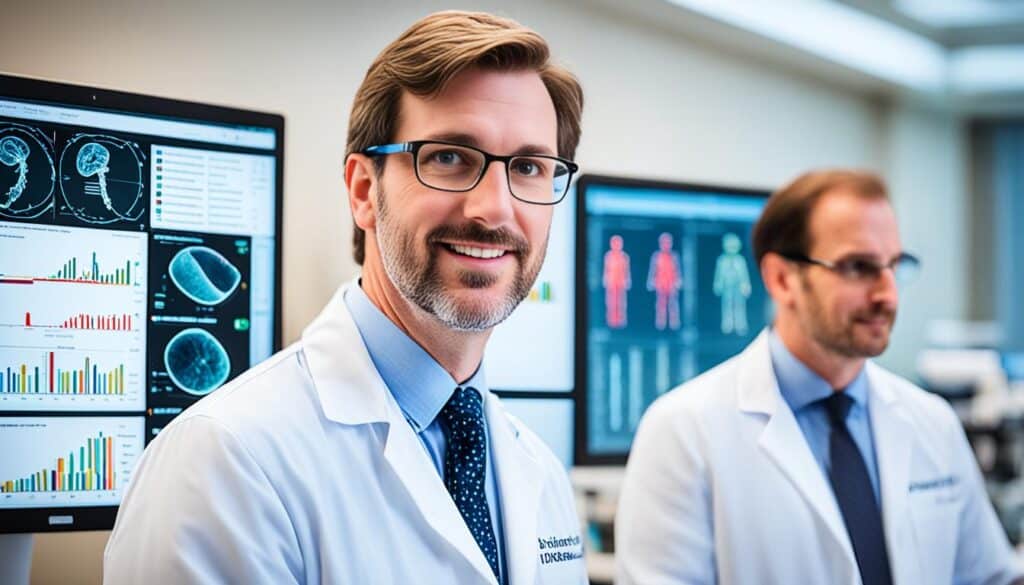Welcome to our comprehensive guide on medical education, where we will unveil the best medical schools worldwide. Whether you’re a prospective student seeking the finest institutions in medical education or a curious reader looking to explore the top names in the field, this article is your gateway to discovering the elite institutions that offer exceptional medical programs, leading research, and unmatched opportunities for students.
Key Takeaways:
- Explore the best medical schools worldwide known for their commitment to transformative education.
- Discover the leading institutions that provide exceptional medical programs and cutting-edge research opportunities.
- Unveil unparalleled student opportunities available at top-tier medical schools.
- Gain insights into the significance of medical school rankings in identifying the best institutions for medical education.
- Key factors to consider when choosing the best medical school for your needs.
Understanding the Importance of Medical School Rankings
When it comes to pursuing a career in medicine, choosing the right medical school is a crucial step towards your future success. With so many institutions offering medical education, it can be overwhelming to determine which ones are the best. This is where medical school rankings come into play. These rankings provide valuable insights into the top medical schools around the world, helping you make an informed decision about where to pursue your medical degree.
Medical school rankings are not arbitrary; they are based on meticulous evaluation criteria that assess the quality of education, faculty expertise, research opportunities, student satisfaction, and more. The rankings offer a comprehensive overview of the top medical schools globally, considering various factors that contribute to their overall excellence.
By referring to medical school rankings, you can identify the best institutions that offer exceptional medical education, cutting-edge research opportunities, and a supportive learning environment. These rankings serve as a reliable guide, ensuring that you make an informed choice in selecting a medical school that aligns with your career aspirations and personal goals.
Furthermore, medical school rankings also provide valuable information about the strengths and areas of focus of each institution. For example, some schools may excel in a particular medical specialty or have a strong emphasis on primary care. By understanding the unique strengths of each institution, you can tailor your application and select a medical school that aligns with your specific interests and career goals.
Key Benefits of Medical School Rankings:
- Identify the top medical schools: Medical school rankings compile a list of the best institutions worldwide, making it easier to narrow down your choices.
- Ensure quality education: Highly ranked medical schools are known for providing an exceptional education, equipping students with the knowledge and skills necessary to excel in their medical careers.
- Access to top-notch research opportunities: The ranking system considers a school’s research output and funding, meaning highly ranked institutions often offer extensive research programs and opportunities.
- Networking and collaboration: Attending a top-ranked medical school offers the chance to connect with and learn from esteemed faculty members, renowned researchers, and fellow high-achieving students.
- Enhanced career prospects: Medical school rankings can influence future job prospects and residency program placement, as prestigious institutions often have a strong reputation within the healthcare industry.
When considering medical school rankings, it’s essential to remember that they should be used as a starting point for your research. Rankings alone should not be the sole determinant of your decision; it’s crucial to consider other factors such as location, curriculum, campus culture, and personal fit. However, by understanding the importance of medical school rankings, you can better navigate the process of choosing the best institution for your medical education.
Medical school rankings are an invaluable resource for aspiring medical professionals. Whether you’re looking for top-tier research opportunities or a program with a strong emphasis on primary care, the rankings can help you identify the best medical schools tailored to your specific interests and goals.
| Ranking | Medical School | Location |
|---|---|---|
| 1 | Harvard Medical School | Boston, Massachusetts |
| 2 | Johns Hopkins University School of Medicine | Baltimore, Maryland |
| 3 | Stanford University School of Medicine | Stanford, California |
| 4 | University of Oxford Medical School | Oxford, England |
| 5 | University of Cambridge School of Clinical Medicine | Cambridge, England |
Top Medical Schools for Research
If you are passionate about medical research, you need to consider the top medical schools renowned for their research programs. These institutions are at the forefront of pushing boundaries and making significant discoveries that shape the field of medicine.
One such institution is the Johns Hopkins University School of Medicine. Known for its world-class medical research, Johns Hopkins combines innovative thinking with state-of-the-art facilities, enabling breakthroughs in various medical specialties. Their commitment to excellence in research has led to groundbreaking advancements and a strong reputation in the medical community.
Another top medical school for research is Stanford University School of Medicine. With cutting-edge labs and extensive research opportunities, Stanford focuses on interdisciplinary collaborations to tackle complex medical challenges. Their research initiatives span diverse fields, from genomics to neurosciences, fostering innovation and driving progress in medical science.
The Massachusetts General Hospital Institute of Health Professions, affiliated with Harvard Medical School, is another prominent institution for medical research. Their dedication to advancing healthcare through evidence-based research has earned them a well-deserved reputation as a leader in medical research.
Research Opportunities and Collaborations
One of the key benefits of attending these top medical schools is the abundance of research opportunities and collaborations available to students. These institutions have established robust research infrastructure, providing students with access to cutting-edge technology, mentorship from renowned researchers, and the chance to contribute to groundbreaking studies.
Additionally, the strong partnerships these medical schools forge with leading research institutions, hospitals, and biotech companies create a dynamic environment for collaborative research endeavors. Students have the chance to work alongside experts in their field, gaining invaluable experience and exposure to the latest advancements in medical research.
Medical research pushes the boundaries of knowledge, leading to transformative breakthroughs in healthcare. By attending a top medical school for research, you can immerse yourself in this dynamic field, contribute to groundbreaking studies, and shape the future of medicine.
Rankings and Recognition
When considering medical schools for research, it’s important to look at their rankings and recognition in the field. Institutions that consistently appear in the top rankings for medical research are often the ones with a strong commitment to advancing medical knowledge.
| Medical School | Ranking for Medical Research |
|---|---|
| Johns Hopkins University School of Medicine | 1st |
| Stanford University School of Medicine | 2nd |
| Harvard Medical School | 3rd |

The table above highlights the rankings of some of the top medical schools for research. These rankings serve as a testament to the institutions’ dedication to advancing medical knowledge through research and innovation.
Choosing a top medical school for research ensures that you will be surrounded by like-minded individuals and experts in your field. The collaborative research environment, plentiful funding opportunities, and access to cutting-edge resources will provide you with a solid foundation for a successful career in medical research.
Best Medical Schools for Primary Care
If primary care and specialized medical fields are your passions, you’ll be delighted to know that there are exceptional medical schools that excel in training students for careers in primary care and various medical specialties. These institutions provide comprehensive curriculum, hands-on training, and invaluable experiences that prepare graduates to deliver high-quality healthcare.
1. Johns Hopkins University School of Medicine
Johns Hopkins University School of Medicine is renowned for its commitment to primary care education and research. Located in Baltimore, Maryland, this prestigious institution offers innovative programs that equip students with the skills and knowledge necessary to excel in primary care specialties such as family medicine, pediatrics, and internal medicine. With state-of-the-art facilities and a distinguished faculty, Johns Hopkins University School of Medicine is a top choice for aspiring primary care physicians.
2. Stanford University School of Medicine
Stanford University School of Medicine, situated in Stanford, California, is another top-ranked institution known for its excellence in primary care education. With a strong focus on patient-centered care and interdisciplinary collaboration, Stanford University equips medical students with the foundation to become leaders in primary care practice. The school’s cutting-edge research and innovative programs provide students with unique opportunities to explore various medical specialties within primary care.
3. University of Washington School of Medicine
The University of Washington School of Medicine, located in Seattle, Washington, is a leader in primary care training. The school emphasizes community engagement and aims to address healthcare disparities through its curriculum and research initiatives. The University of Washington School of Medicine provides students with mentorship opportunities, clinical experiences, and resources to develop their skills in primary care and make a positive impact on community health.
“The best medical schools for primary care are those that prioritize comprehensive training, foster a patient-centered approach, and provide ample opportunities for students to gain practical experience.”
These are just a few examples of the many outstanding medical schools that prioritize primary care education. When considering your options, it is crucial to research each institution’s curriculum, faculty expertise, and clinical opportunities to ensure it aligns with your career goals. Whether you aspire to be a family physician, pediatrician, or internist, these top medical schools will provide you with an exceptional education that prepares you for success in primary care and various medical specialties.
Best Medical Schools in the United States
When it comes to medical education, the United States boasts some of the finest institutions in the world. These schools are renowned for their exceptional programs, cutting-edge research, and rigorous admissions processes. If you aspire to become a medical professional, it’s crucial to explore the top medical colleges in the US to find the right fit for your educational journey.
US News has compiled comprehensive rankings that evaluate medical schools based on various factors such as academic reputation, faculty resources, and research output. These rankings serve as a guide for aspiring medical students looking to pursue excellence in their education.
One of the top medical schools in the US is Harvard Medical School, located in Boston, Massachusetts. As an Ivy League institution, Harvard Medical School consistently ranks among the best in the nation. Its rigorous curriculum, renowned faculty, and state-of-the-art facilities attract some of the brightest minds in medicine.

Another prestigious institution is the Johns Hopkins University School of Medicine. Located in Baltimore, Maryland, Johns Hopkins is globally recognized for its groundbreaking research and comprehensive medical programs. It offers a wide range of specialties and attracts students from across the country.
For those aspiring to practice medicine in the West Coast, the Stanford University School of Medicine provides exceptional education and research opportunities. Located in Stanford, California, this prestigious institution emphasizes a multidisciplinary approach to medical training, fostering collaboration and innovation.
These are just a few examples of the top medical colleges in the United States. Each institution offers unique strengths and opportunities for students to excel in their medical careers. When considering your options, it’s essential to not only focus on rankings but also consider factors such as location, curriculum, research opportunities, and student support.
Exploring the top medical schools in the United States is the first step toward realizing your dream of a career in medicine. As you delve into the admissions process, remember that these institutions are highly competitive, and a strong academic record, along with a passion for healthcare, will greatly enhance your chances of success.
So, seize the opportunity, do your research, and embark on a transformative medical education journey at one of the best medical schools in the United States.
Top Medical Schools in the World
When it comes to medical education, the world is filled with prestigious institutions that have earned their place among the best in the world. These top medical schools offer exceptional programs, world-class faculty, and unrivaled opportunities for aspiring healthcare professionals. Let’s dive into the world of medical education and explore the renowned institutions that consistently rank highly in global standings.
| Rank | Medical School | Country |
|---|---|---|
| 1 | Harvard Medical School | United States |
| 2 | University of Oxford Medical School | United Kingdom |
| 3 | Johns Hopkins University School of Medicine | United States |
| 4 | Stanford University School of Medicine | United States |
| 5 | University of Cambridge School of Clinical Medicine | United Kingdom |
These rankings are based on various factors, including research output, academic reputation, faculty expertise, and student outcomes. It’s worth noting that while these institutions hold esteemed positions in global rankings, there are many other exceptional medical schools around the world that provide world-class education and training.
Attending a top medical school can open doors to unparalleled opportunities for students. From cutting-edge research projects to clinical rotations in renowned hospitals, students at these institutions are exposed to a wealth of resources and experiences that shape their medical journey.

Exploring medical schools in different countries can offer valuable insights into diverse healthcare systems and approaches to medicine. Whether you aspire to study in the United States, United Kingdom, or any other country, it’s important to carefully consider your aspirations, personal preferences, and career goals before making a decision.
As we continue our journey through the world of medical education, let’s explore the financial considerations associated with medical school tuition and available scholarships in the next section.
Financial Considerations: Tuition and Medical School Scholarships
When embarking on a journey towards a medical degree, it’s essential to understand the financial considerations involved. Tuition fees can be a significant factor influencing your decision to pursue higher education in the medical field. On top of that, the cost of attending medical school can often be daunting.
Tuition: The cost of tuition may vary depending on the medical school you choose. Some prestigious institutions have higher tuition fees due to the quality of education and resources they offer. However, it’s important to note that a higher tuition fee doesn’t always correlate with a better education. Many excellent medical schools provide top-notch education at affordable rates.
Financial Aid Options: To make medical education more accessible, various financial aid options are available. These options include federal student loans, grants, work-study programs, and scholarships. It’s crucial to explore all possible avenues for financial assistance and determine which options align with your needs.
Medical School Scholarships: Scholarships specifically tailored for medical students can be a game-changer in reducing the financial burden of pursuing a medical degree. Many medical schools offer scholarships based on academic merit, leadership qualities, financial need, or specific areas of interest. Additionally, several external organizations and foundations provide scholarships to aspiring medical students.
“Scholarships can significantly alleviate the financial strain of medical school. Take the time to research and apply for scholarships that align with your background, interests, and career aspirations.”
It’s crucial to research and identify medical school scholarships that resonate with your background, interests, and career aspirations. By investing time in thorough scholarship searches and crafting compelling applications, you can increase your chances of receiving financial support.
To get a better sense of the financial landscape, here’s a visual representation of the average tuition fees at some well-known medical schools:
| Medical School | Average Tuition (per year) |
|---|---|
| Harvard Medical School | $64,984 |
| Johns Hopkins School of Medicine | $59,800 |
| Stanford University School of Medicine | $60,665 |
| University of California, San Francisco School of Medicine | $41,799 (in-state) $53,467 (out-of-state) |

Please note that the tuition fees mentioned here are subject to change and may not include additional expenses such as housing, books, and other educational materials.
While tuition fees and financial considerations play a significant role in your medical education journey, it’s important to prioritize your passion for medicine and the quality of education provided by each institution. Thoroughly research both the financial and academic aspects to make an informed decision that aligns with your goals and values.
Admission Process: How to Get into the Best Medical Schools
Securing admission to the best medical schools requires careful planning and preparation. Aspiring medical students must navigate a competitive and rigorous admission process to secure a spot in their desired institution. In this section, we will guide you through the application process, provide tips for success, and highlight the significance of the Medical College Admissions Test (MCAT).
Application Process
Applying to medical schools can be an overwhelming process, but breaking it down into manageable steps can help alleviate some of the stress. Here are essential components of the application process:
- Research and Select Schools: Begin by researching and selecting the medical schools that align with your goals, preferences, and location preferences.
- Preparation of Application Materials: Gather all necessary documents, including transcripts, letters of recommendation, a personal statement, and a resume.
- Complete the AMCAS Application: The American Medical College Application Service (AMCAS) is a centralized application system utilized by many medical schools. Ensure that you complete and submit your AMCAS application accurately and within the designated deadlines.
- Secondary Applications: Some medical schools may require secondary applications after reviewing your AMCAS application. Pay close attention to each school’s specific requirements and deadlines.
- Interviews: If your application is successful, you may be invited for an interview. Prepare for these interviews by researching the school, practicing commonly asked questions, and showcasing your passion for medicine.
- Submit Updated Transcripts: Update your AMCAS application with your most recent transcripts to reflect any new coursework or achievements since submission.
- Wait for Decision Notifications: After completing all the necessary steps, patiently await decision notifications from the medical schools to which you have applied.
Tips for Success
To increase your chances of gaining admission into the best medical schools, consider the following tips:
- Start Early: Begin your preparation early to ensure ample time for researching schools, studying for the MCAT, and completing application materials.
- Stay Organized: Keep track of application deadlines, required documents, and submission dates for each school you are applying to.
- Showcase Your Passion: Use your personal statement and interviews to demonstrate your passion for medicine and your commitment to making a difference in healthcare.
- Highlight Your Experiences: Share your experiences in healthcare, research, volunteering, and leadership roles to showcase your dedication and well-roundedness.
- Seek Guidance: Don’t hesitate to reach out to pre-med advisors, mentors, or professionals in the field for guidance and support throughout the application process.
“The journey to medical school admission is demanding, but perseverance and dedication will lead you to your dream institution.” – Dr. Lisa Johnson, Dean of Admissions, ABC Medical School
The Importance of the MCAT
The Medical College Admissions Test (MCAT) is a crucial component of the medical school application process. This standardized exam assesses a candidate’s knowledge of the natural, social, and behavioral sciences, as well as their critical thinking and problem-solving skills.
Preparing for the MCAT requires diligent study and practice. Consider enrolling in MCAT prep courses, utilizing study materials, and taking practice tests to familiarize yourself with the exam format and content.
Many medical schools weigh MCAT scores heavily when making admissions decisions. A strong MCAT score can significantly enhance your chances of securing a spot in the best medical schools.
“Scoring well on the MCAT demonstrates your readiness for the challenges of medical school and your ability to excel in a rigorous academic environment.” – Dr. Sarah Williams, Director of Admissions, XYZ Medical College
By carefully navigating the admission process, putting forth your best effort, and highlighting your unique qualities, you can increase your chances of gaining admission to the best medical schools and embarking on a rewarding medical career.

Opportunities for Students: Beyond the Classroom
Medical education extends beyond classroom lectures. Aspiring medical professionals have a wide range of opportunities to enhance their learning, gain practical experience, and expand their horizons. These opportunities play a crucial role in shaping well-rounded and competent healthcare providers.
Clinical Rotations
One valuable opportunity for medical students is the chance to participate in clinical rotations. During these rotations, students work alongside experienced medical professionals, gaining hands-on experience in various medical specialties. This immersive learning experience allows students to develop essential skills, learn from real patient cases, and understand the practical application of their medical knowledge.
Research Fellowships
For students interested in medical research, research fellowships provide a unique opportunity to contribute to groundbreaking discoveries. Many medical schools offer research programs where students can collaborate with renowned researchers, work on cutting-edge projects, and contribute to advancements in medical science. These fellowships allow students to delve deeper into specific areas of interest and develop critical research skills.
Global Health Programs
In an increasingly interconnected world, global health programs offer medical students the chance to gain a broader perspective on healthcare. These programs provide opportunities to work in underserved communities, learn about different healthcare systems, and address global health challenges. Through international experiences, students can develop cultural competence, empathy, and a deeper understanding of healthcare disparities.
Advanced Medical Training
In addition to core medical education, advanced medical training programs allow students to specialize in specific areas of medicine. These programs, such as residencies and fellowships, provide in-depth training and mentorship under the guidance of experienced physicians. Whether aspiring to become a surgeon, cardiologist, or any other medical specialist, advanced training programs offer focused learning and hands-on experience in the chosen field.
“The opportunities available to medical students beyond the classroom are invaluable for their personal and professional growth. Clinical rotations, research fellowships, global health programs, and advanced medical training allow them to explore their interests, gain practical skills, and make a positive impact in the field of healthcare.” – Dr. Emily Davis, Medical Education Specialist
By taking advantage of these various opportunities, medical students can maximize their educational experience and develop the skills necessary to excel in their future healthcare careers.
Notable Medical Schools: Harvard Medical School and Yale School of Medicine
When it comes to medical education, Harvard Medical School and Yale School of Medicine are considered among the finest institutions in the world. These prestigious schools have a rich history of excellence and have consistently ranked among the top universities for medical degrees.
Harvard Medical School, affiliated with Harvard University, is renowned for its commitment to innovation, research, and clinical care. With a focus on interdisciplinary collaboration, Harvard Medical School provides students with a comprehensive education that incorporates cutting-edge technology and advances in medical science. Graduates from Harvard Medical School have gone on to make significant contributions to the field of medicine and healthcare.
Yale School of Medicine, part of Yale University, is recognized for its rigorous academic curriculum and emphasis on clinical education. The school fosters a supportive and collaborative environment that allows students to engage in hands-on learning and gain practical experience. Yale School of Medicine’s commitment to research and patient-centered care ensures that students are well-prepared to address the evolving healthcare needs of society.
Both Harvard Medical School and Yale School of Medicine attract top-tier faculty members who are leaders in their respective fields. These faculty members provide mentorship and guidance to aspiring medical professionals, supporting their personal and professional growth.
Furthermore, the reputation and network of these esteemed institutions open doors to a wide range of opportunities for students. Graduates from Harvard Medical School and Yale School of Medicine are highly sought after by hospitals, research institutions, and healthcare organizations around the world.
Notable Alumni
Harvard Medical School and Yale School of Medicine boast an impressive list of notable alumni who have left an indelible mark in the medical field:
- Harvard Medical School:
- Dr. Paul Farmer – Co-founder of Partners In Health, an international health organization
- Dr. William Stewart – Former Surgeon General of the United States
- Dr. Patricia Bath – Ophthalmologist and pioneer of laser cataract surgery
- Yale School of Medicine:
- Dr. C. Everett Koop – Former Surgeon General of the United States
- Dr. Harvey Cushing – Considered the father of modern neurosurgery
- Dr. Helen Brooke Taussig – Pediatric cardiologist and co-developer of the Blalock-Taussig shunt
Harvard Medical School and Yale School of Medicine have established themselves as premier institutions for medical education, research, and patient care. These top universities continue to shape the future of healthcare, producing exceptional medical professionals who make a positive impact on the lives of countless individuals.
If you are aspiring to pursue a medical degree, consider the distinguished education and opportunities offered by Harvard Medical School and Yale School of Medicine. Their commitment to excellence, innovation, and advancing medical knowledge make them worthy contenders for those seeking a transformative medical education.
Choosing the Best Medical School: Factors to Consider
Selecting the best medical school for your needs is a significant decision. When embarking on your journey towards a medical career, it’s essential to consider several key factors that can influence your educational experience and future opportunities. Here are some crucial aspects to weigh when choosing the optimal fit:
1. Location
Consider the location of the medical school and whether it aligns with your personal preferences and lifestyle. Factors such as proximity to home, climate, urban versus rural environment, and cultural attractions may all play a role in your decision-making process.
2. Curriculum
Analyze the curriculum of each prospective medical school to ensure it aligns with your learning style and career goals. Look for schools that offer a comprehensive and well-structured curriculum that encompasses both theoretical knowledge and practical clinical experiences.
3. Faculty and Resources
Evaluate the qualifications, expertise, and accessibility of the faculty members. A strong faculty can provide mentorship, guidance, and opportunities for research collaborations. Additionally, investigate the resources available to students, such as state-of-the-art laboratories, libraries, and medical simulation facilities.
4. Research Opportunities
Consider the research opportunities offered by each medical school. Engaging in research can broaden your understanding of medical science and open doors to future career prospects. Look for institutions known for their research programs and faculty members who are actively involved in groundbreaking studies.
5. Range of Medical Programs
Assess the range of medical programs and specialties offered by the school. Ensure that your desired area of interest is represented, providing opportunities for specialization or exposure to various medical fields. A diverse range of programs allows for flexibility and the ability to explore different aspects of medicine.
6. Student Support and Community
Investigate the level of student support and the sense of community within the medical school. A supportive environment, access to counseling services, and student organizations can enhance your learning experience, promote personal well-being, and foster lifelong connections within the medical community.
By carefully considering these factors, you can make an informed decision when choosing the best medical school that aligns with your goals, values, and aspirations. Remember that finding the perfect fit is essential for a transformative medical education and a successful future in the field of healthcare.
Also Read:- What Opportunities Does Medical Education Offer?
Conclusion
In conclusion, finding the best medical education and top healthcare institutions requires careful research and consideration. By exploring the top medical schools worldwide, you open doors to transformative educational experiences that will shape your future career in healthcare.
These renowned institutions provide unparalleled opportunities for students to learn from distinguished faculty, engage in cutting-edge research, and gain hands-on experience through clinical rotations and global health programs.
Whether you aspire to specialize in primary care or pursue a career in medical research, the best medical schools offer diverse programs and resources to support your goals.
FAQs
Q: What are the key considerations when looking for the best medical schools?
A: When searching for the best medical schools, factors to consider include rankings, program offerings, location, cost, reputation, and fit with your personal and academic goals.
Q: How can I improve my chances of getting into medical school?
A: To increase your chances of getting into medical school, focus on maintaining a high GPA, scoring well on the MCAT exam, gaining relevant clinical experience, participating in extracurricular activities, and securing strong letters of recommendation.
Q: What are the typical requirements for admission to medical school?
A: Common requirements for medical school admission include a bachelor’s degree, completion of specific prerequisite courses, a competitive GPA and MCAT score, letters of recommendation, personal statement, and sometimes an interview.
Q: Where can I find a list of the top medical schools worldwide?
A: You can find lists of the best medical schools globally through various sources such as reputable rankings like those from U.S. News, which provide rankings of medical schools based on factors like research, faculty quality, and student outcomes.
Q: What are some of the best medical schools in Texas?
A: Texas boasts several top medical schools, including the University of Texas Southwestern Medical Center, Baylor College of Medicine, and Texas Tech University Health Sciences Center. These schools are renowned for their academic programs and research opportunities.
Q: Are there any public medical schools known for their excellence?
A: Yes, public medical schools like the Texas Health Science Center and Texas Tech University Health Sciences Center are well-regarded for their quality education, research initiatives, and clinical training opportunities.
Q: How do I determine which medical school is the best fit for me?
A: To find the best medical school for you, consider factors such as program offerings, location, faculty expertise, research opportunities, campus culture, and the overall environment to ensure a good match with your academic and personal interests.





